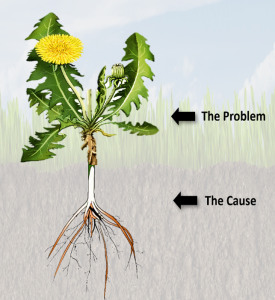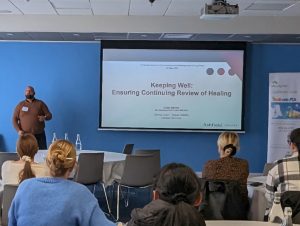- Purpose-Built Software
- Live Date Availability
- Custom Mapping to Your Needs
January 31st and May 8th, 2025 – Ashfield Services’ Tissue Viability Clinical Lead, Colin Davies, was invited to present at Healthcare Conferences UK, delivering two thought-provoking talks on the prevention and management of leg ulcers. His mission: to challenge outdated perceptions and encourage clinicians to adopt evidence-based, vascular-led approaches to care.
Changing Perspectives on a Chronic Condition

For many healthcare professionals, leg ulcers have long been seen as notoriously difficult to treat, with high recurrence rates and limited options beyond compression therapy. Colin, who has specialised in leg ulcers for over 25 years, urged delegates to rethink this outlook.
Drawing on a memorable analogy, he likened leg ulcers to weeds in a garden:
“If we only pick at the leaves, the problem keeps coming back. To truly solve it, we must treat the root.”
This metaphor emphasised his central message; focus on underlying vascular causes, not just surface symptoms.
Modern Treatments: Beyond Lifelong Compression
Colin highlighted the advances in minimally invasive procedures now widely available across the NHS, such as foam sclerotherapy and radiofrequency ablation. These treatments, supported by robust clinical trials, have been proven to speed healing and drastically reduce recurrence – offering patients freedom from the prospect of lifelong compression stockings.
He also underlined the economic impact:
Evidence That Speaks Volumes
Colin presented compelling data from his 25 years of clinical practice:
This model, based on early assessment, early compression, and early intervention, consistently achieved far better outcomes than symptom-led approaches.

Feedback and Inspiration
Delegates, many of them community and hospital nurses, responded enthusiastically. One attendee commented:
“Figures are my least favourite thing, but he made them seem interesting.”
Conference organisers also reported highly positive feedback, reflecting a strong appetite among clinicians for practical, evidence-driven strategies.
Ashfield Services’ Ongoing Commitment
As part of his role with Ashfield Services, Colin regularly leads a two-day module on leg ulcer management, equipping practitioners with the knowledge and tools to deliver better patient outcomes.
“Together, we can move away from short-term symptom management and towards long-term healing,” Colin concluded.
With research, training, and practical innovation at the forefront, Ashfield Services continues to raise standards in wound care across the UK.
Talk to our team today on the training we can offer in this space.
We use cookies to improve your experience on our site. By using our site, you consent to cookies.
Manage your cookie preferences below:
Essential cookies enable basic functions and are necessary for the proper function of the website.
Google Tag Manager simplifies the management of marketing tags on your website without code changes.
Statistics cookies collect information anonymously. This information helps us understand how visitors use our website.
Google Analytics is a powerful tool that tracks and analyzes website traffic for informed marketing decisions.
Service URL: policies.google.com (opens in a new window)
You can find more information in our Cookie Policy and Privacy Policy.